Idaho Biographies ~ Eastman to Yates
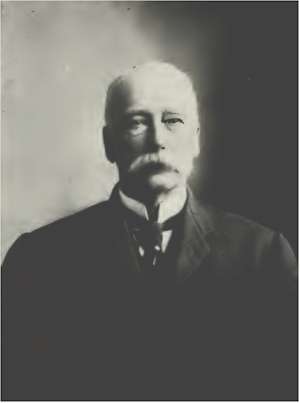
Eastman, Hosea Bradford
Hosea Bradford Eastman, who is one of Idaho's leading citizens,
is of old Revolutionary stock. His grandfather, Ebenezer
Eastman, fought in the Revolutionary war, and his ancestors were
all of great prominence. Mr. Eastman's father was Caleb Eastman,
a farmer, and his mother was Tabitha Aldredge Eastman. His early
education was obtained in the public schools of Whitefield, New
Hampshire, where he was born November 21, 1835. At the age of
twenty he went to work in a saw mill and logging camp, where he
remained for five years in his home country. In the fall of 1861
he went to California, where he worked for about one year and
six months on a stock farm. In the winter of 1863 he went to
Auburn, Oregon, where he engaged in mining for a couple of
years, and then came to Idaho, and built and ran the Idaho Hotel
in Silver City, until November, 1877, when he bought the
Overland Hotel at Boise City, and was also interested in real
estate. He conducted the hotel until 1892, when he leased it.
Mr. Eastman's brother, B. M. Eastman, was also interested with
him in business.
Mr. Eastman was one of the organizers of the Boise City National
Bank in 1886, and was vice-president of the bank until 1906,
when it was sold. He is still a director. He is also general
manager of the Boise City Artesian Hot and Cold Water Company.
He also formed the Eastman-Teller Hardware Company in 1902,
which company is now run by his son, B. S. Eastman. Mr. Eastman
was a member of the City Council and of the school board of
Boise City, and was one of the organizers of the Commercial Club
and a charter member of lodge No. 310, B. P. 0. E. He is
interested with Mr. Regan in the Overland Building, the finest
office building in Boise City.
September, 1872, H. B. Eastman was married to Mary A. Blackinger
of Idaho, and they have two children: Frank M. and Ben S.
Eastman. Mr. Eastman with his family resides at 1215 Warm
Springs Avenue, Boise, Idaho.
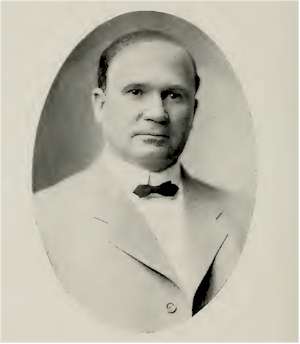
Gooding, Frank R.
Frank R. Gooding was born October 16,
1859, in England, his father being John Gooding, a farmer, his
mother Elizabeth Gooding. While he was still a child his parents
immigrated to America, settling in Michigan, and he was educated
in the common schools of that State. He came West in the
seventies and settled in Idaho, where he engaged in the
livestock business. Idaho was admitted a State in 1890.
Mr. Gooding was elected to the fifth legislature and in 1904 he
was elected Governor of the State as a Republican. Two years
later he was re-elected to the same office. He was married in
Idaho in 1880. The result of his union was three children, John
M., Maud Elizabeth, and Louise, all living.
It was during his second administration that the celebrated case
of Pettibone, Moyer and Heywood, came up for trial. These men
were leaders of the Western Federation of Miners, who were
charged with being the instigators of the assassination of
ex-Governor Frank Steunenberg at the gate of his own home in
Caldwell, Idaho, by the explosion of a bomb. The result was the
acquittal of the three men, although Governor Gooding and his
administration used every effort to secure a conviction.
Governor Gooding retired from office on January 1st, 1909. He
resides at Gooding, a town named after him, in Lincoln County,
Idaho.
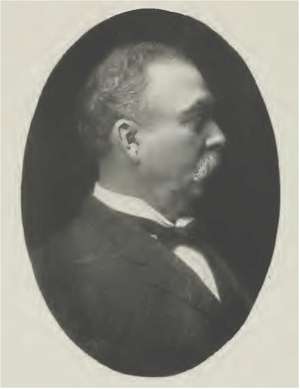
Hawley, J. H.
Mention of Idaho would be incomplete did
it fail to include the name of James H. Hawley, politician,
lawyer and public servant of the Gem State since his admission
to the bar of Idaho in 1871.
James H.
Hawley was born in Dubuque, Iowa, January 17th, 1847, his father
being Thomas Hawley and his mother Annie Carr. The young man
received his earlier education in the Dubuque high school, but
early showed a tendency to seek western fields for the outlet of
his ambition and a short time after completing his schooling he
settled in Idaho. For a number of years Mr. Hawley was a miner,
making his headquarters at Quartzburg, Idaho, completing his
education in the rough and ready school of western adversity.
During these years, however, he was not idle and in 1871 he was
admitted to the bar and began the practice of law. In 1875 he
was married to Mary E. Bullock, but long before this he had
distinguished himself in public life, having been a member of
the lower house of the Idaho legislature in 1870-1 and of the
upper house in 1874-5. During the period from 1879 to 1883 he
filled the position of district attorney of the 2nd judicial
district and from 1884 to 1887 he was United States attorney for
Idaho.
Upon his
retirement from that office Mr. Hawley proceeded to devote his
full time and attention to the practice of law and early reaped
a rich reward in his chosen field of endeavor. At all times
regarded as one of the foremost legal lights of his State, he
has been prominently identified with some of the most important
legal actions which have ever taken place within the confines of
Idaho. His success has been rapid and far reaching. Early known
as an orator of force and strength, as a pleader he has achieved
brilliant success. At this time he is the head of what is
perhaps the best-known legal firm in the Gem State and in the
years which have followed his early efforts he has established a
record for success which is the pride and envy of the entire
State.
Gifted with a
lively imagination and with a positive, forceful temperament,
well read and well posted on current events, Mr. Hawley is at
once a delightful companion and a marvel of intellectual
ability. In the practice of law and by means of such business
ventures as have claimed his attention, he has accumulated a
comfortable fortune of this world's goods. He has, however,
stood ready at all times to assist his less fortunate neighbor
in any way which lay within his power.
While no
longer young, Mr. Hawley is possessed of the same tireless
energy and indomitable courage which in his earlier years went
so far towards establishing him upon the high road to the
success which he has since achieved. In recent years, however,
his life has been quiet as compared with the period of his early
struggles for recognition. He is the owner of a well-appointed
home in Boise, where surrounded by his family Mr. Hawley is to
be seen at his best in every respect. Should he decide to
re-enter public life, however, a still further measure of
success is constantly assured him by his many friends throughout
the entire State.
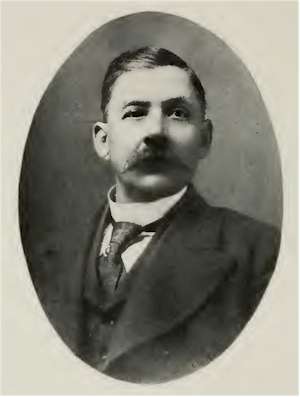
Olmstead, G. H.
George H. Olmstead, one of the most
prominent railroad men in the United States and for over forty
years connected with various rail-roads throughout the country
in important positions, is a native of New York State, having
been born in Vestal, Broome County, August 18, 1848, a son of
Richard and Elizabeth Olmstead, of that town. The elder Olmstead
was a farmer. George H. Olmstead received his early education in
the public schools and subsequently attended the Susquehanna
Seminary at Binghamton, New York, from which he graduated.
After leaving
school he went west, and his first occupation was as an engineer
on the Napa Railroad in California, where he stayed from 1868 to
1870. He then went with the California Pacific until 1873, and
with the Central Pacific Railroad during the years 1873 and
1874. He then came East and entered the service of the Chicago,
Milwaukee and St. Paul Railroad, where he remained until 1882,
and was then made general foreman of the motive power department
at Sanborn, Iowa, a position he held until 1883. He next became
a conductor on the Chicago, Milwaukee and St. Paul Railroad,
where he remained from 1885 until 1887. From 1889 until 1899 he
was in the service of the C. B. & N. Railroad, and then accepted
the position of traveling conductor of the Montana and Utah
divisions of the Oregon Short Line on May 1, 1899. He was
promoted to trainmaster March 15, 1900, and as acting
superintendent of the Montana division, October 13, 1900, until
July 13, 1901, when he was advanced to the position of
superintendent of the Montana division. He was made
superintendent of the Utah division in addition to his other
position, July 7, 1903, to March 31, 1904, and was appointed
superintendent of the Idaho division June 1, 1905. On October
28, 1908, Mr. Olmstead was granted a leave of absence on account
of ill health, and on February 1, 1909, was appointed
superintendent of the Montana division, which position he now
holds. During the years 1874 and 1875 Mr. Olmstead traveled
extensively through South America and on the Isthmus, and gained
much knowledge of conditions there at that time.
Mr. Olmstead
was married February 17, 1879, and has been a resident of Idaho
since 1899. He first arrived at Helena, Montana, November 10,
1866. He is a director in the Bannock National Bank of
Pocatello, Idaho; a member of all Masonic bodies and of the
Silver Bow Club of Butte and resides at No. 15 Harrison Avenue,
Pocatello, Bannock County, Idaho.
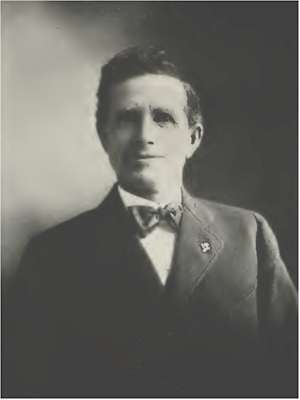
Edward Payne
Edward Payne, who is one of the
best-known business men of Idaho, has been a citizen of Boise
since 1882. The greater part of his wealth was accumulated
during a long period while engaged in sheep-raising. He retired
from this business two years ago and is now president of the
Boise State Bank of Boise, president of the Bank of Commerce of
Arco, Idaho, and is a director of the First Bank of Council,
Idaho.
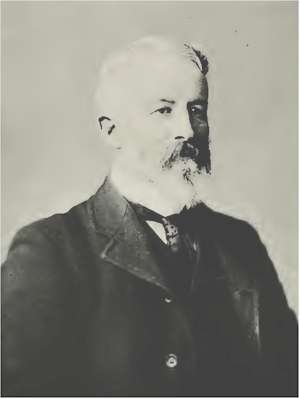
Yates, John E.
The history of Idaho is an interesting
one, and no State in the Union has made more rapid progress than
this important section of the inter-mountain region. It would be
impossible to write the history of Idaho without including the
name of the subject of this brief biography.
John Elvin Yates was born in Bristol, Maine, February 4th, 1845.
He is the son of John Yates, who was a sea captain, and of
Sophia Blunt Yates. Mr. Yates received a common school education
at Bristol, Maine, and later immigrated to Idaho, arriving there
in 1892, and since then has been permanently and actively
identified with many of the most important financial
institutions and other corporations in Idaho. Mr. Yates was at
one time president of and one of the principal owners of the
Yates and Corbus Live Stock Company; was an original
stock-holder and director of the Bank of Commerce, and for
several years its president. He was also a former director in
the Idaho Trust and Savings Bank, and a director in the Farmers'
Bank of Star, Idaho. All of these positions Mr. Yates resigned
upon his determination to retire from an active business career,
which he did during the past year, after sixteen years of an
honorable business career during which time he did much for the
general welfare of Idaho, and was, and is, considered one of the
leading and most public-spirited citizens of Boise City.
Mr. Yates' first wife was Roxanna Cox, of Bristol, Maine, and to
this union no children were born. His second wife was Georgia
Town-send, to whom he was married at Sycamore, Illinois, and
they are the parents of eight children, namely: Dorothy,
Margaret, Marjorie, John T., Oscar T., Frederick T., William T.,
and Stephen T. Yates. Mr. Yates was a member of the sixth
session of the Idaho legislature, and a member of the Boise City
council for two years. He is a member of the Masonic fraternity
and the Benevolent and Protective Order of Elks.
Though Mr. Yates takes much pride in his achievements during his
life in his adopted State, he has, however, a warm spot in his
heart for the State of Maine, where he first saw the light of
day within sight of the sea. . Being descended from a race of
sailors he went to sea himself as a boy for seven dollars per
month, and with the assistance of such friends as he made
himself he became the commander and part owner of as fine a ship
as ever sailed the seas in the Oriental trade in the days of
sailing ships; and can refer to this day to the builders of the
ships and to those whose business and money he handled in all
parts of the world.

Index

Source: Sketches of the Inter-Mountain
States, Utah, Idaho and Nevada, Published by The Salt Lake
Tribune, Salt Lake City, Utah, 1909
|


